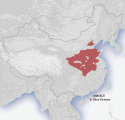supercat
Major
In its economic preformance China has in today not even come close to the former Soviet Union on a per capita level. Around 1970 the income gap between an average Russian and an average American was far less than what it is today between an average Chinese and an American.
When was the last time the Soviet Union had the world's largest GDP in PPP terms? Being the largest manufacturer of physical goods in the world? The largest automobile manufacturer and market in the world? One of the largest ship builder in the world? The largest trading nation in the world? By far the largest steel and concrete manufacturer and user in the world? The answer is no for all these questions for the Soviet Union, and all yes for China. Here is an example of China's current manufacturing prowess and economic scale for you: in November (last month), China made 3.01 million autos, which is equivalent to an annualized production rate of 36 millions. In comparison, the highest annual auto production rate ever in the U.S. was about 18 million units. China can easily triple its military spending to rival that of the America's, and it will still count less than 6% of her GDP. The Soviet Union, on the other hand, had to spend up to 20% of its GDP on military, which eventually ruined its economy.
Another important point is national debt: Compare the entire Chinese debt with that of the Soviet Union in 1980: Is it 100 or 500 times larger? Actually the Soviet Union didn't have a debt but financial reserves.
It is interesting that when talking about income, you talk in per capita terms, while taking about debt, you switch to terms of aggregate. Almost all of China's debt is internal. Internal debt does not really matter that much. On the other hand, China has a huge domestic savings account of more than $20 trillion (in U.S. dollars), and a foreign exchange reserve of more than $3 trillion (the largest in the world). Since China can easily spend as much as the U.S. on military (Don't forget that the U.S. also has huge domestic debts), it's very unwise for Trump to provoke China to embark on a rapid build-up of both her conventional and nuclear forces.
In the end any dictator can deliver some economic growth for some decades, see a Mussolini, Franco or a Park in South Korea. Why has not even one half-developed country still such a dictator in charge? Think about that and you know why the Chinese system as it is today will not last.
But Chinese "dictators" are THE "dictators" - they are different from all the other dictators - both the speed and the scale of China's rise under the Chinese "dictators" are unprecedented in human history. Even if it lasts only 10 more years, China probably will still become by far the world's largest economy, even in market exchange terms. Have some patience, just wait and see.

